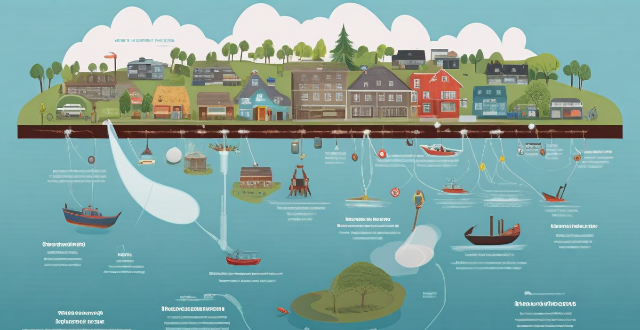The article discusses the significant role of global warming in climate disasters, highlighting its impacts on extreme weather events, sea level rise, ecosystems, and food security. It emphasizes the importance of taking action to mitigate these effects through strategies such as reducing greenhouse gas emissions, adapting to changing climate conditions, supporting research and innovation, and encouraging international cooperation.

The Role of Global Warming in Climate Disasters
Global warming, a long-term increase in Earth's average surface temperature due to human activities, plays a significant role in climate disasters. This phenomenon is primarily caused by the emission of greenhouse gases (GHGs) such as carbon dioxide (CO2), methane (CH4), and nitrous oxide (N2O) into the atmosphere. These gases trap heat from the sun, leading to an increase in global temperatures, which in turn contributes to various climate disasters.
How Global Warming Contributes to Climate Disasters
1. Extreme Weather Events
Global warming has been linked to an increase in the frequency and intensity of extreme weather events, such as:
- Heatwaves: Higher temperatures can lead to more frequent and severe heatwaves, which can cause heat-related illnesses and deaths, especially among vulnerable populations like the elderly and young children.
- Heavy Rainfall and Floods: Warmer air can hold more moisture, leading to increased rainfall and flooding. This can damage infrastructure, disrupt transportation, and cause loss of life and property.
- Droughts: Regions may experience longer and more intense droughts due to changes in precipitation patterns, affecting agriculture, water resources, and ecosystems.
- Tropical Storms and Hurricanes: Warmer ocean temperatures can intensify these storms, leading to stronger winds, heavier rainfall, and higher storm surges that can cause extensive damage and loss of life.
2. Sea Level Rise
Global warming causes the thermal expansion of seawater and the melting of ice caps and glaciers, leading to a rise in sea levels. This can result in:
- Coastal flooding during high tides and storms
- Erosion of beaches and dunes
- Saltwater intrusion into freshwater sources
- Displacement of coastal communities due to increasing flood risk
3. Impact on Ecosystems and Biodiversity
Climate change driven by global warming affects ecosystems and biodiversity in various ways, including:
- Changes in species distribution and migration patterns
- Loss of habitat for some species, leading to extinction or endangerment
- Alterations in ecosystem structure and function, affecting ecosystem services like pollination, water regulation, and nutrient cycling
4. Food Security and Agriculture
Global warming also impacts food security and agriculture by:
- Affecting crop yields due to changes in temperature and precipitation patterns
- Increasing the risk of pests and diseases
- Reducing water availability for irrigation
- Decreasing soil quality and fertility
Mitigating the Effects of Global Warming on Climate Disasters
To mitigate the effects of global warming on climate disasters, it is essential to take action at both individual and governmental levels. Some strategies include:
- Reducing greenhouse gas emissions through renewable energy sources, energy efficiency, and sustainable transportation
- Adapting to changing climate conditions by improving infrastructure resilience, developing early warning systems, and implementing climate-smart agriculture practices
- Supporting research and innovation in climate science and technology to better understand and address the challenges posed by global warming
- Encouraging international cooperation and policy initiatives to tackle climate change collectively
In conclusion, global warming plays a crucial role in climate disasters by exacerbating extreme weather events, causing sea level rise, impacting ecosystems and biodiversity, and affecting food security and agriculture. Addressing this issue requires a multifaceted approach that combines mitigation efforts with adaptation strategies to build a more resilient future for our planet.